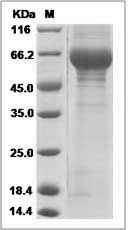-
Product Name
Human LCAT (His Tag) recombinant protein
- Documents
-
Description
Central enzyme in the extracellular metabolism of plasma lipoproteins. Synthesized mainly in the liver and secreted into plasma where it converts cholesterol and phosphatidylcholines (lecithins) to cholesteryl esters and lysophosphatidylcholines on the surface of high and low density lipoproteins (HDLs and LDLs). The cholesterol ester is then transported back to the liver. Has a preference for plasma 16:0-18:2 or 18:O-18:2 phosphatidylcholines. Also produced in the brain by primary astrocytes, and esterifies free cholesterol on nascent APOE-containing lipoproteins secreted from glia and influences cerebral spinal fluid (CSF) APOE- and APOA1 levels. Together with APOE and the cholesterol transporter ABCA1, plays a key role in the maturation of glial-derived, nascent lipoproteins. Required for remodeling high-density lipoprotein particles into their spherical forms.
-
Protein name
Phosphatidylcholine-sterol acyltransferase
-
Protein short names
AI046659; D8WSU61E
-
Uniprot ID
P04180
-
Gene Name
LCAT
-
Source/Expression Host
Human Cells
-
Expression Plasmid/cDNA
A DNA sequence encoding the human LCAT (NP_000220.1) (Met1-Glu440) was expressed with a polyhistidine tag at the C-terminus.
-
Protein Species
Human
-
Molecular weight
The recombinant human LCAT consists 427 amino acids and predicts a molecular mass of 48.5 kDa.
-
Purity
> 85 % as determined by SDS-PAGE.
-
Validations

Human LCAT Protein (His Tag)
Related Products / Services
Please note: All products are "FOR RESEARCH USE ONLY AND ARE NOT INTENDED FOR DIAGNOSTIC OR THERAPEUTIC USE"
